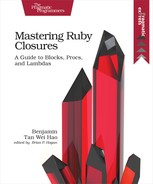Chapter 2
-
Here’s an implementation that uses our version of Array#each:
class Array def each x = 0 while x < self.length yield self[x] x += 1 end end def map res = [] each { |x| res << yield(x) } res end end Here, we make use of the element that is yielded from each iteration of each and collect each element into res.
-
Here’s a possible implementation:
class String def each_word x = 0 # => 0 words = self.split while x < words.length yield words[x] x += 1 end end end -
Your final code should look something like this:
class File def self.open(name, mode, &block) file = new(name, mode) return file unless block_given? yield(file) ensure file.close end end -
Does run require a block to be passed in?
Yes. There is no block_given?, and yield is called without any conditionals.
-
How is the return result of the block used?
The return result of the block is compared with :exit.
-
How could this code be called?
The key here is that the block passed has exactly one argument:
Server.new.run do |session| # do something with session end
-
-
The only change is to the Schema class:
module ActiveRecord class Schema def self.define(version, &block) instance_eval &block end def self.create_table(table_name, options = {}, &block) t = Table.new(table_name, options) yield t end end end Let’s take a look at the DSL again:
ActiveRecord::Schema.define(version: 20130315230445) do create_table "microposts", force: true do |t| t.string "content" t.integer "user_id" t.datetime "created_at" t.datetime "updated_at" end end In the outermost block, (ActiveRecord::Schema.define do ... end), we instance_eval it in the context of the Schema class. That’s because the create_table method used in the block body is a class method.
The innermost block, create_table do ... end, takes a block with a single parameter. That parameter is a Table object. We can do yield t, or t.instance_eval &block would achieve the same effect.
